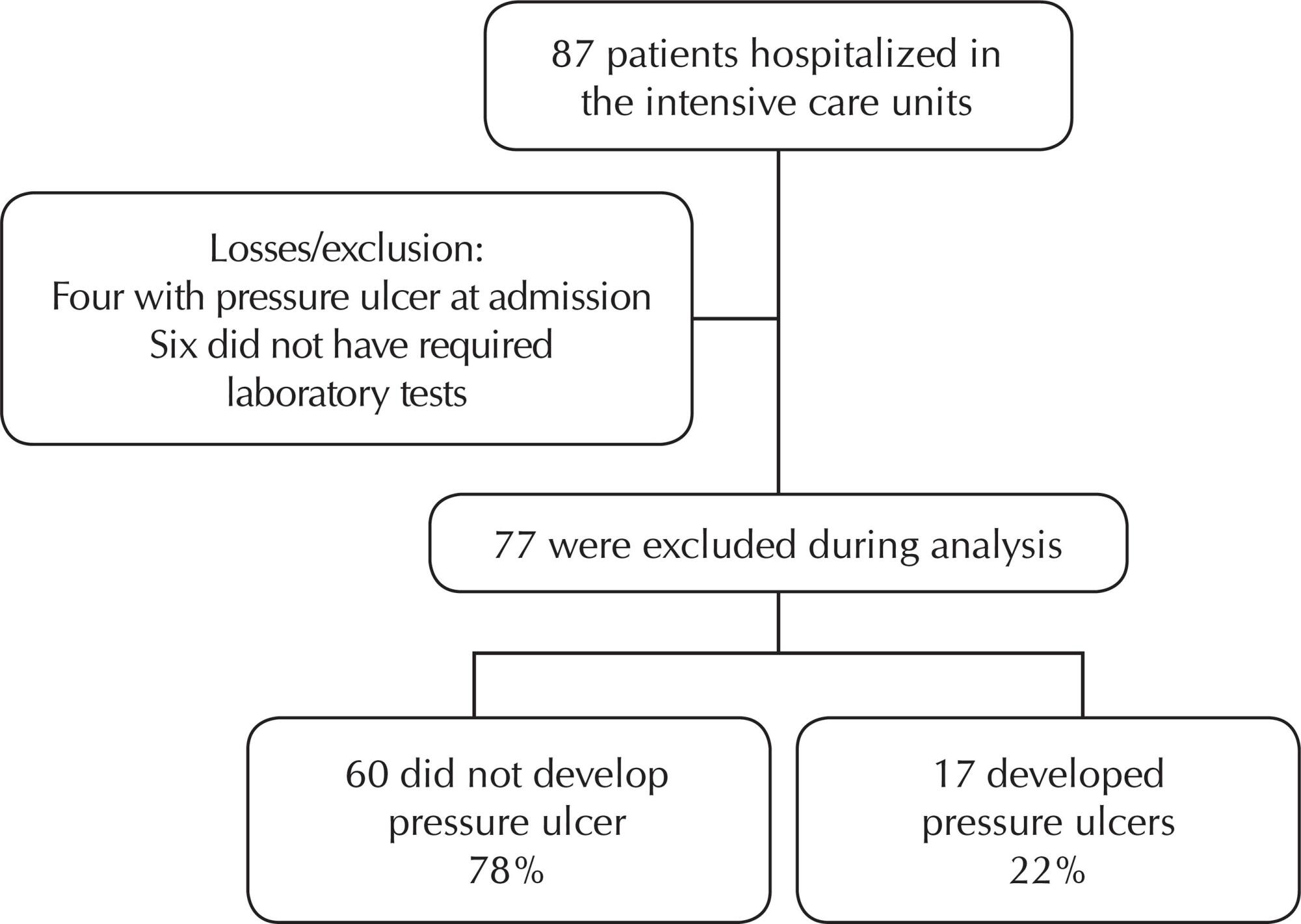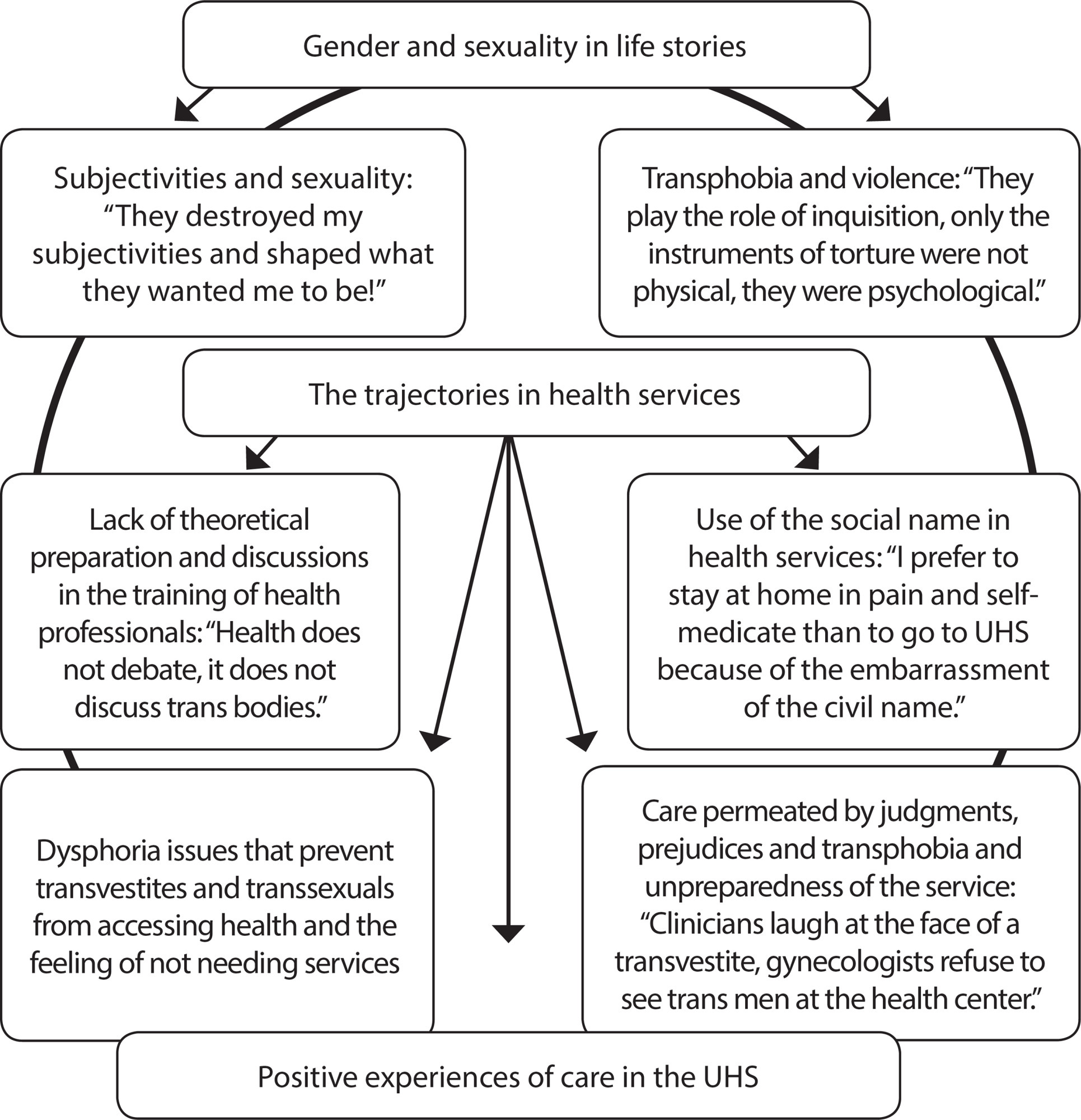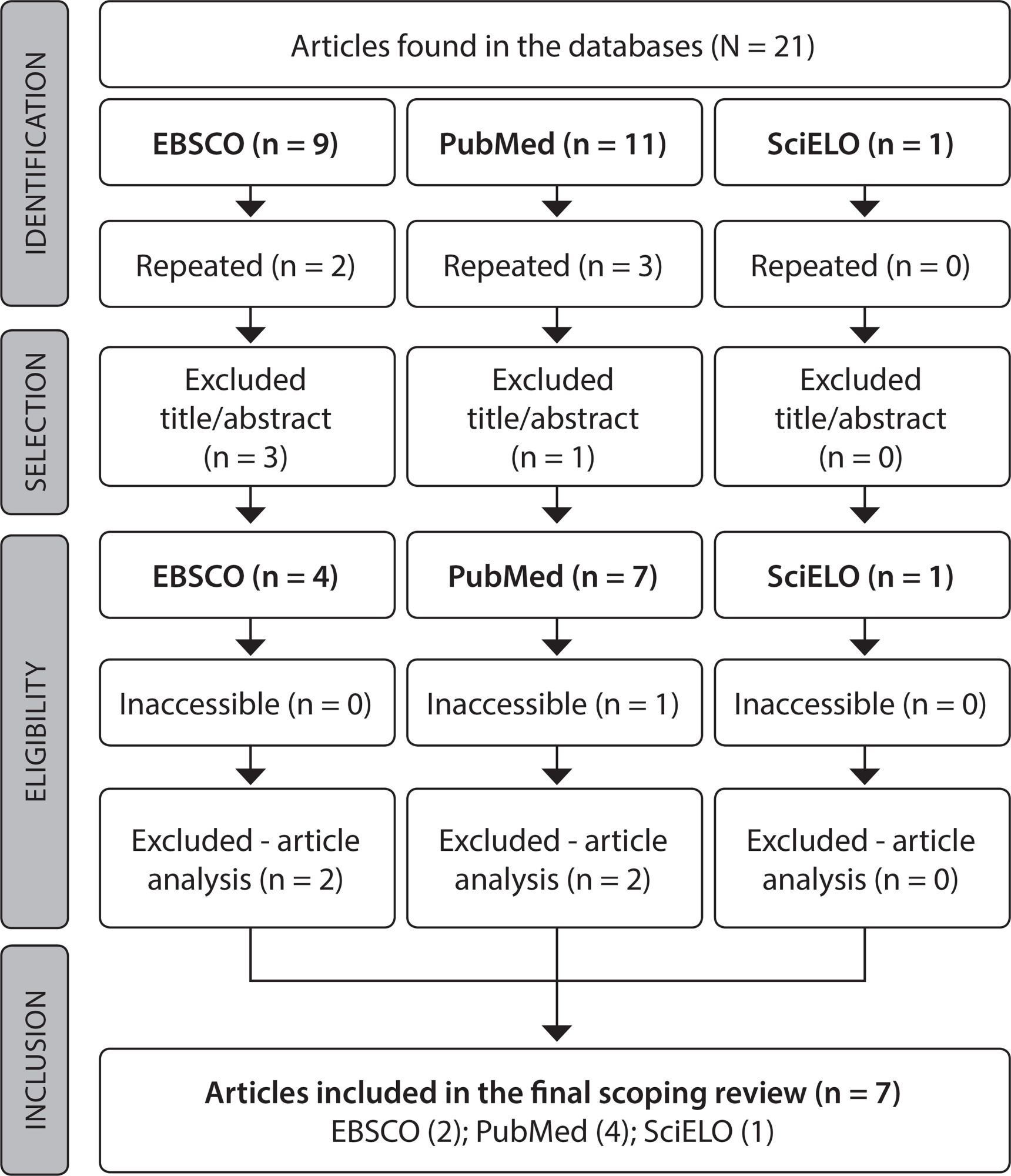-
01-01-2016
Association between self-care and hospital readmissions of patients with heart failure
Revista Brasileira de Enfermagem. 2016;69(3):500-506
Abstract
Association between self-care and hospital readmissions of patients with heart failure
Revista Brasileira de Enfermagem. 2016;69(3):500-506
DOI 10.1590/0034-7167.2016690312i
Views0See moreABSTRACT
Objective:
to assess the association between self-care and the number of hospital readmissions of patients with heart failure (ADHF) and test the applicability of two self-care assessment tools. longitudinal study, performed in a cardiology reference hospital in southern Brazil.
Method:
it included 82 patients with a mean age of 61.85±12.33 years, 57.3% male. The mean score of self-care assessment found the scales European Heart Failure Self-care Behavior Scale and Self-care Scale for Patients with Heart Failure was unsatisfactory.
Results:
it was observed an average of 2.57±1.66 rehospitalization last year for decompensated heart failure. There was a correlation between self-care scores with the number of hospital readmissions for decompensated HF. Education and age were associated to self-care of HF patients.
Conclusion:
both scales assess self-care in a relevant way, and correlated their indexes.
-
01-01-2016
Knowledge management in Portuguese healthcare institutions
Revista Brasileira de Enfermagem. 2016;69(3):492-499
Abstract
Knowledge management in Portuguese healthcare institutions
Revista Brasileira de Enfermagem. 2016;69(3):492-499
DOI 10.1590/0034-7167.2016690311i
Views0See moreABSTRACT
Objective:
to evaluate the perception of healthcare institution collaborators in relation to knowledge management in the institution where they operate and analyze the existence of differences in this perception, based on the institution’s management model.
Method:
a study conducted in a sample consisting of 671 collaborators from 10 Portuguese healthcare institutions with different models of management. In order to assess the knowledge management perception, we used a score designed from and based on items from the scores available in the literature.
Results:
the perception of moderate knowledge management on the healthcare institutions and the statistically significant differences in knowledge management perception were evidenced in each management model.
Conclusion:
management knowledge takes place in healthcare institutions, and the current management model determines the way staff at these institutions manage their knowledge.
-
01-01-2016
Social impairment of patients undergoing hematopoietic stem cell transplant
Revista Brasileira de Enfermagem. 2016;69(3):484-491
Abstract
Social impairment of patients undergoing hematopoietic stem cell transplant
Revista Brasileira de Enfermagem. 2016;69(3):484-491
DOI 10.1590/0034-7167.2016690310i
Views0See moreABSTRACT
Objective:
to evaluate the impairment of social and emotional domains of hospitalized patients undergoing hematopoietic stem cells transplantation.
Method:
an observational, longitudinal study with 25 participants evaluated in the period of pre-transplant, pancytopenia and pre-hospital discharge between September 2013 and September 2014, in a reference hospital for this treatment modality in Brazil. Two international instruments were used, both of which translated and adapted to Portuguese (Brazil): Quality of Life Questionnaire-Core 30 and Functional Assessment Cancer Therapy – Bone Marrow Transplantation.
Results:
patients have shown a statistically significant decrease in the social domain, and stability of the emotional function along the course of treatment.
Conclusion:
hematopoietic stem cell transplantation changes the social function of patients with hematologic cancer during hospitalization stage. Thus, patients should receive guidance addressing the social domain in order that it can be less affected.
-
01-01-2016
Frailty and quality of life in elderly primary health care users
Revista Brasileira de Enfermagem. 2016;69(3):478-483
Abstract
Frailty and quality of life in elderly primary health care users
Revista Brasileira de Enfermagem. 2016;69(3):478-483
DOI 10.1590/0034-7167.2016690309i
Views1See moreABSTRACT
Objective:
to investigate the association between physical frailty and quality of life in elderly users of primary health care in the capital of the state of Paraná.
Method:
a cross-sectional, quantitative study with 203 elders. Data collected included: physical activity questionnaires, weight loss, fatigue/exhaustion, quality of life, performance of gait speed tests, and handgrip strength.
Results:
of the 203 older adults, 115 were pre-frail, 49 were non-frail, and 39 were frail, with a significant association with functional capacity and quality of life in all groups. The dimensions resulting from physical aspects, pain, and vitality were associated with those that were non-frail.
Conclusion:
in this study, frailty syndrome was inversely proportional to the quality of life, and significantly associated with functional capacity of older adults. Physical frailty is a manageable condition which can be targeted through geriatric nursing interventions.
-
01-01-2016
Impact of home visits on the functional capacity of patients with venous ulcers
Revista Brasileira de Enfermagem. 2016;69(3):468-477
Abstract
Impact of home visits on the functional capacity of patients with venous ulcers
Revista Brasileira de Enfermagem. 2016;69(3):468-477
DOI 10.1590/0034-7167.2016690308i
Views0See moreABSTRACT
Objective:
to assess the impact of protocol home visits on the functional capacity of adult and elderly patients with venous ulcers, before and after guidance received at home.
Method:
clinical experimental, randomized, nonblinded and controlled study, developed with 32 patients (case and control groups). Fields of research were the Wound Outpatient Care Unit of the Antônio Pedro University Hospital and households of patients treated in the outpatient unit. Data collection occurred from February to June 2014, by means of an assessment tool of the health care unit, the TINETTI index and a script for directions to be provided to study participants who received home visits.
Results:
participants in the case group showed significant and differentiated improvement post-intervention when compared to the control group, which remained stable.
Conclusion:
directions provided in the home context were beneficial to the members of the case group.
-
01-01-2016
Pressure ulcers in critically ill patients: incidence and associated factors
Revista Brasileira de Enfermagem. 2016;69(3):460-467
Abstract
Pressure ulcers in critically ill patients: incidence and associated factors
Revista Brasileira de Enfermagem. 2016;69(3):460-467
DOI 10.1590/0034-7167.2016690307i
Views0See moreABSTRACT
Objective:
to identify the incidence and describe the associated factors for pressure ulcers in critically ill patients.
Method:
this was a prospective cohort study with 77 patients, using a clinical, metabolic assessment and the associated factors for pressure ulcer, applying the risk scales (Braden and Waterlow) and assigning ulcers to categories.
Results:
an incidence of 22% (95% CI 12.6 – 31.5), with 17 patients with 32 pressure ulcers in the sacral region (47%), and of Class I (72%). The length of stay was greater than ten days (71%), most admissions were surgical (53%) or for congestive heart failure (24%), and were high risk on the Braden Scale (59%).
Conclusion:
the study highlights the high incidence of pressure ulcers, clinical and metabolic characteristics and associated factors, as well as the outcome of death, requiring, therefore, preventive measures.

-
01-01-2016
Accreditation in a public hospital: perceptions of a multidisciplinary team
Revista Brasileira de Enfermagem. 2016;69(3):451-459
Abstract
Accreditation in a public hospital: perceptions of a multidisciplinary team
Revista Brasileira de Enfermagem. 2016;69(3):451-459
DOI 10.1590/0034-7167.2016690306i
Views1See moreABSTRACT
Objective:
to analyze the perceptions of the multidisciplinary team on Accreditation in a public hospital.
Method:
descriptive, exploratory, qualitative research, performed in May 2014, using recorded individual interviews. In total, 28 employees of a public hospital, Accredited with Excellence, answered the guiding question: “Tell me about the Accreditation system used in this hospital”. The interviews were transcribed and subjected to content analysis.
Results:
of the speeches, three categories emerged: Advantages offered by the Accreditation; Accredited public hospital resembling a private hospital; Pride/satisfaction for acting in an accredited public hospital.
Conclusion:
participants perceived Accreditation as a favorable system for a quality management in the public service because it promotes the development of professional skills and improves cost management, organizational structure, management of assistance and perception of job pride/satisfaction.
-
01-01-2016
Health status and the return to work after traffic accidents
Revista Brasileira de Enfermagem. 2016;69(3):443-450
Abstract
Health status and the return to work after traffic accidents
Revista Brasileira de Enfermagem. 2016;69(3):443-450
DOI 10.1590/0034-7167.2016690305i
Views0See moreABSTRACT
Objective:
to compare the health status of traffic accident victims, at hospital discharge and after six months, and to analyze the predictive variables of their health status and return to work.
Method:
observational, longitudinal study. Data were collected through interviews and medical records of 102 patients with a mean age of 33 years; with the majority being men and victims of motorcycle accidents. The variables were analyzed by means of validated tools, student’s t-test, multiple linear regression, and logistic regression.
Results:
there was an improvement of perception in the patients’ health status six months after hospital discharge and functional capacity. The individuals who returned to work showed better health-related quality of life evaluation.
Conclusion:
improvement of the perceived health status six months after hospital discharge was found. Factors that influenced the patients’ return to work were not identified.
-
ORIGINAL ARTICLE10-28-2020
“Health does not discuss trans bodies”: Oral History of transsexuals and transvestites
Revista Brasileira de Enfermagem. 2020;73:e20190228
Abstract
ORIGINAL ARTICLE“Health does not discuss trans bodies”: Oral History of transsexuals and transvestites
Revista Brasileira de Enfermagem. 2020;73:e20190228
DOI 10.1590/0034-7167-2019-0228
Views0See moreABSTRACT
Objectives:
to understand the life stories and itineraries of transvestites and transsexuals in health services.
Methods:
study with a qualitative approach, anchored in the methodological framework of Oral History. Interviews were conducted and thematically analyzed.
Results:
two themes emerged: 1) gender and sexuality in life stories; and 2) the trajectories in health services. These revealed the challenges in the process of recognizing gender identity before the family and society. The reports show the dilemmas that transsexuals and transvestites face in health care, which ends up generating the removal of this population from services.
Final Considerations:
it has been demonstrated that Oral History can increase knowledge, especially about life histories and trajectories in the health services of transvestites and transsexuals; in addition, information was offered that can assist managers and health professionals in making decisions or caring for these people.

-
ORIGINAL ARTICLE07-10-2020
Working conditions and depression in hospital emergency service nurses
Revista Brasileira de Enfermagem. 2020;73:e20180952
Abstract
ORIGINAL ARTICLEWorking conditions and depression in hospital emergency service nurses
Revista Brasileira de Enfermagem. 2020;73:e20180952
DOI 10.1590/0034-7167-2018-0952
Views0See moreABSTRACT
Objective:
to analyze the presence, intensity and factors related to working conditions for depressive symptoms in hospital emergency nurses in the east of São Paulo.
Methods:
a descriptive, exploratory, quantitative and qualitative study, which applied psychometric scales and interview script.
Results:
nurses (95.24%) had depressive symptoms by the assessment scales by the observer, most with mild and moderate intensity. Inadequate working conditions led to suffering. Factors that trigger depressive symptoms were: disorganized work; harmful relationship with immediate management; inappropriate physician behavior; aggressions; lack of inputs, infrastructure and human resources; professional devaluation. Identified professionals with depressive symptoms who, because they were unaware of being affected by the disorder, did not seek treatment, continued to perform activities that compromised their physical and mental health, promoting damage to the assistance provided.
Final considerations:
high frequency of depressive symptoms. The precarious work environment negatively influenced the care and development of depressive symptoms.
-
ORIGINAL ARTICLE06-01-2020
Nursing students: medication use, psychoactive substances and health conditions
Revista Brasileira de Enfermagem. 2020;73:e20190003
Abstract
ORIGINAL ARTICLENursing students: medication use, psychoactive substances and health conditions
Revista Brasileira de Enfermagem. 2020;73:e20190003
DOI 10.1590/0034-7167-2019-0003
Views0See moreABSTRACT
Objective:
to assess the use of nonprescription psychoactive medications and their associations with psychoactive substance use and health aspects among nursing students.
Method:
a cross-sectional study conducted with 182 students at a nursing school in the city of Vale do Ribeira, Brazil. Sociodemographic information, screening for alcohol, tobacco and other drug use, information on physical and mental health and physical activity practices were assessed.
Results:
more than half of the students (79.2%) used psychoactive drugs without prescription, with a predominance of monthly consumption. Consumption of these drugs was found to be associated with alcohol use, binge drinking, smoking and illicit drug use.
Conclusion:
the findings have implications for the implementation of health promotion strategies among nursing students, in view of lifestyle changes.
-
08-07-2023
Chemsex and its repercussions on the health of men who have sex with men (MSM): a global health perspective
Revista Brasileira de Enfermagem. 2023;76(3):e20230004
Abstract
Chemsex and its repercussions on the health of men who have sex with men (MSM): a global health perspective
Revista Brasileira de Enfermagem. 2023;76(3):e20230004
DOI 10.1590/0034-7167-2023-0004
Views0See moreABSTRACT
Objectives:
to discuss the repercussions of chemsex on the health of men who have sex with men (MSM), contextualizing it in a global health scenario and pointing out the implications for nursing care.
Methods:
theoretical-reflexive study based on scientific literature and concepts related to global health.
Results:
we present the epidemiology of the chemsex phenomenon, the main demands of the field, the reasons why it has become a global public health problem, and the implications for nursing practice.
Final Considerations:
chemsex is growing in all age groups of MSM and is globally benefiting from location-based applications to gain magnitude, finding an important potential audience in the migrant population. Nursing structures can help accelerate the proposal and implementation of biomedical and behavioral measures to address chemsex in its entirety, qualifying care and inducing teamwork with interprofessional collaboration.
-
ORIGINAL ARTICLE05-24-2021
Critical thinking in nursing training: evaluation in the area of competence Education in Health
Revista Brasileira de Enfermagem. 2021;74:e20200979
Abstract
ORIGINAL ARTICLECritical thinking in nursing training: evaluation in the area of competence Education in Health
Revista Brasileira de Enfermagem. 2021;74:e20200979
DOI 10.1590/0034-7167-2020-0979
Views0See moreABSTRACT
Objective:
To analyze the constitution of critical thinking in nursing training in the approach by competence and the integrated curriculum, considering the evaluation process by capturing its challenges, and proposing overcoming strategies.
Methods:
Qualitative. In the first phase of data collection, interviews were conducted with twenty-four professors, nine preceptors, and fifteen students to reconstruct the profile of competence, and in the second phase, a workshop to validate the profile identified challenges and proposals. The Collective Subject Discourse was used to analyze the interviews and the holistic competence reference in reconstructing the profile.
Results:
The critical thinking is built based on experiences in the world of work, and evaluation is the conductor of reflections towards emancipation.
Final considerations:
It signals the importance of professor training in the learning evaluation and working with the collective construction of subjects to overcome challenges that happen in the changes of training.
-
REVIEW11-25-2020
Nurse’s interventions in preventing falls in hospitalized children: scoping review
Revista Brasileira de Enfermagem. 2020;73:e20190409
Abstract
REVIEWNurse’s interventions in preventing falls in hospitalized children: scoping review
Revista Brasileira de Enfermagem. 2020;73:e20190409
DOI 10.1590/0034-7167-2019-0409
Views1See moreABSTRACT
Objectives:
map both nursing interventions for the prevention of falls in paediatric age during hospitalization and the instruments for assessing the risk of falls in paediatrics.
Methods:
scoping review according to the protocol of Joanna Briggs Institute, with acronym PCC (P – children, C – fall preventive nursing interventions and instruments for assessing the risk of falling, C – hospital admission), in three sources of information (EBSCO, PubMed and SciELO).
Results:
the sample consisted of seven articles. The education of the child/family is the basis of the interventions, and the instruments for assessing the risk of falling identified were: Humpty Dumpty Falls Scale, GRAF PIF, CUMMINGS, I’M SAFE and CHAMPS.
Conclusions:
the education of children/parents on preventive measures is important and should be reinforced during hospitalization, using different methodologies. The Humpty Dumpty Falls Scale was the most analyzed.

-
ORIGINAL ARTICLE06-14-2021
Mothers’ knowledge of premature newborn care and application of Kangaroo Mother Care at home
Revista Brasileira de Enfermagem. 2021;74(6):e20200717
Abstract
ORIGINAL ARTICLEMothers’ knowledge of premature newborn care and application of Kangaroo Mother Care at home
Revista Brasileira de Enfermagem. 2021;74(6):e20200717
DOI 10.1590/0034-7167-2020-0717
Views0See moreABSTRACT
Objective:
to identify mothers’ knowledge about premature newborn care and application of Kangaroo Mother Care at home.
Methods:
a descriptive, qualitative study carried out with 15 mothers of premature newborns in a reference Maternal and Child Hospital in northern Brazil using two semi-structured interviews with open- and closed-ended questions. The testimonies were analyzed using thematic analysis technique, proposed by Bardin.
Results:
two thematic categories originated: “Caring for a premature newborn at home: strengths and weaknesses” and “Applying Kangaroo Mother Care at home: new knowledge acquired during hospitalization”.
Final considerations:
the speeches of the interviewed mothers pointed out their knowledge about home care of premature NBs and understanding the importance of Kangaroo Mother Care, mainly acquired and improved with the guidance of professionals during hospitalization and application of the method, in addition to fears, possible difficulties in home care and the need to be better informed at hospital discharge.
-
ORIGINAL ARTICLE05-03-2021
Nursing care for patient in postoperatory heart surgery in the Intensive Care Unit
Revista Brasileira de Enfermagem. 2021;74(2):e20200163
Abstract
ORIGINAL ARTICLENursing care for patient in postoperatory heart surgery in the Intensive Care Unit
Revista Brasileira de Enfermagem. 2021;74(2):e20200163
DOI 10.1590/0034-7167-2020-0163
Views0See moreABSTRACT
Objective:
To investigate the critical nodes related to nursing care for patients in the postoperative period of cardiac surgery.
Methods:
Exploratory study with a qualitative approach. Data collected through semi-structured interviews with 27 members of the nursing team working in the Intensive Care Unit. Material submitted to thematic analysis.
Results:
Three categories emerged: Flaws in the professional qualification for patient care in the postoperative period of cardiac surgery; Team challenges concerning specific patient care in the postoperative period of cardiac surgery; and (dis) organization of work in the Intensive Care Unit and its impact on nursing care for patients in the postoperative period of cardiac surgery.
Final considerations:
Given the identification of the critical nodes, the professionals presented suggestions to overcome daily difficulties: investments in strategies for Permanent Education in Health; creation of tools to guide patient assistance in the postoperative of cardiac surgery; and provision of adequate human resources.
Search
Search in:
Nuvem de Tags
Adolescente (85) Atenção Primária à Saúde (239) COVID-19 (91) Criança (91) Cuidados de Enfermagem (269) Educação em Enfermagem (151) Educação em Saúde (139) Enfermagem (930) Enfermagem Pediátrica (86) Estudantes de Enfermagem (77) Estudos de Validação (131) Família (87) Idoso (208) Promoção da Saúde (99) Qualidade de Vida (104) Saúde do Trabalhador (86) Saúde Mental (145) Saúde Pública (82) Segurança do Paciente (150) Tecnologia Educacional (100)



